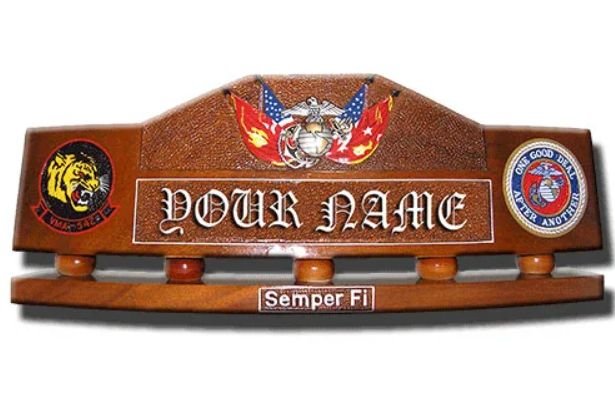In the Philippines, amidst a culture rich in tradition and a deep respect for service, the military wooden desk nameplate crafted from solid wood stands as a powerful symbol of identity, rank, and dedication. More than just a functional item for identification, these nameplates embody a unique blend of practicality, tradition, and the inherent value Filipinos place on natural materials and skilled craftsmanship. Their enduring popularity within the Philippine military speaks volumes about the cultural significance attached to them.

The tradition of using wooden nameplates in the military likely has roots in practicality. Solid wood, readily available in the Philippines with its diverse forests, offered a durable and respectable material for creating these markers of authority. Unlike fragile paper or easily scratched metal, wood possesses a certain gravitas and longevity, mirroring the commitment expected of military personnel. Over time, this practicality has evolved into a cherished tradition, passed down through generations of servicemen and women.
The choice of solid wood is particularly significant in the Philippine context. Wood has always held a special place in Filipino culture, used for building homes, crafting tools, and creating intricate works of art. Certain hardwoods, like Narra (the national tree, known for its strength and beauty), Molave (prized for its durability), and Kamagong (valued for its dark, ebony-like quality), are highly esteemed. When these woods are used for military nameplates, they imbue the object with a sense of inherent value and connection to the land. The natural grain and unique character of each piece of wood ensure that every nameplate is distinct, reflecting the individuality of its owner within the structured environment of the military.
The craftsmanship involved in creating these nameplates further enhances their significance. Often, skilled artisans meticulously carve the wood, sometimes adding intricate details, unit insignias, or the seal of the Armed Forces of the Philippines (AFP). This level of detail transforms a simple identifier into a personalized emblem of service and belonging. The act of receiving a well-crafted wooden nameplate can be a moment of pride for a military member, signifying their formal recognition and integration into their unit.
The popularity of these wooden military desk nameplates persists for several reasons. Firstly, they foster a sense of unity and camaraderie within military units. Identical in form yet personalized with individual names and ranks, they create a visual representation of a cohesive team. In a profession where discipline and order are paramount, these nameplates contribute to a sense of professionalism and respect within the office environment.
Secondly, the tangible nature of wood connects with a cultural appreciation for natural materials. In a rapidly digitalizing world, the solid feel and organic warmth of a wooden nameplate offer a grounding presence on a desk. It serves as a constant, physical reminder of one’s duty and accomplishments.
Furthermore, these nameplates often become cherished mementos of a military career. As officers and enlisted personnel move through different assignments and eventually retire, their wooden desk nameplate serves as a tangible link to their years of service, the bonds they forged, and the sacrifices they made. The durability of the wood ensures that these memories can be preserved for years to come, becoming family heirlooms that tell stories of dedication to the nation.
The popularity and tradition of military wooden desk nameplates made from solid wood in the Philippines are deeply intertwined with cultural values, practicality, and a profound respect for military service. More than just office accessories, they are symbols of identity, unity, and enduring commitment, crafted from the islands’ rich natural resources and imbued with the spirit of Filipino craftsmanship. As long as tradition and a sense of pride in service remain strong within the Philippine military, these solid wooden markers will undoubtedly continue to hold a place of honor on the desks of its dedicated personnel.
